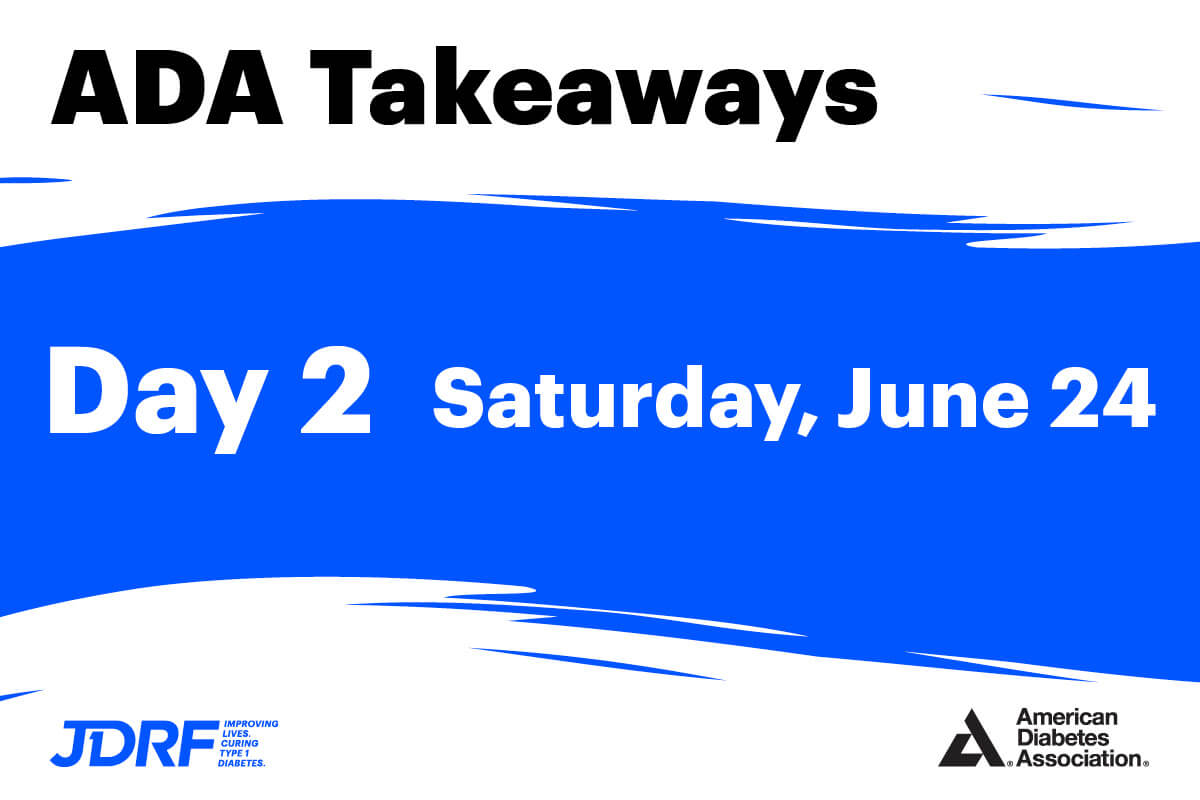ADA’s Scientific Sessions: Takeaways Day 2

The American Diabetes Association’s 83rd Scientific Sessions is here! Until June 26, scientists will present the latest type 1 diabetes (T1D) research, from beta cell replacement to regeneration, and glucose and complications trials, all with the goal of improving lives for the T1D community.
Here are JDRF-funded researchers Drs. Martin Thelin and Robert Eckel to share their key takeaways from day 2, with their commentary in the video and below:
Martin Thelin, M.D., Ph.D.
Clinical Fellow–Pediatrics, University of California, San Francisco
Area: Type 1 Diabetes Through Another Lens—Lessons from Other Disease Settings
It has been known for some time that T1D is associated with increased risk of developing other autoimmune diseases, such as celiac disease, multiple sclerosis, and lupus. But cancer? It turns out that some patients on cancer immunotherapy go on to develop T1D. And there is a monogenic—meaning something that involves or is controlled by one gene—form of diabetes. It’s different from T1D or T2D, and while rare and requires a genetic test for accurate diagnosis, it can be studied for its relationship to T1D.
First up was JDRF-funded Halis Akturk, M.D., who presented on checkpoint inhibitors—drugs that take the brakes off the immune system—in cancer and how they may lead to T1D. Next up was Martin Thelin, M.D., Ph.D., who has a JDRF advanced postdoctoral fellowship in the laboratory of Dr. Mark Anderson, presenting on monogenic diabetes and how it can teach us about T1D. Lastly, there was Edwin Liu, M.D., who presented on celiac disease and how it correlates with T1D.
This session shone a light on how other diseases can be a resource for better understanding and managing T1D.
Robert H. Eckel, M.D.
Professor Emeritus, University of Colorado Anschutz Medical Campus
Area: Implementation of Guideline-Directed Medical Therapy for Cardiometabolic Disease—Emerging Multidisciplinary Initiatives
While he was at the University of Washington in Seattle from 1977 to 1979, Robert Eckel, M.D., was one of the first JDRF-funded postdoctoral fellows. Now at the University of Colorado, he has been president of both the American Diabetes Association and the American Heart Association and has gone on to be an expert in cardiometabolic disorders. Cardiometabolic disorders are a cluster of interrelated factors, including high blood pressure, elevated blood-sugar levels, and high cholesterol, that put someone at high risk for having a heart attack or a stroke. Dr. Eckel also has type 1 diabetes and has had it for more than 70 years.
In Dr. Eckel’s video, he talks about a clinical trial for type 2 diabetes, in which participants had bariatric surgery (surgery intended to help a person lose weight) and were followed for 12 years to see how many people went into remission. In the beginning, the participants lost weight and there was also some remission of type 2 diabetes, which is defined by an HbA1c of under 6.5% and being off diabetes-related medicines. At one year, 50% of participants had a remission of type 2 diabetes. At 12 years, however, most of them—80%—had type 2 diabetes again.
“What are the predictors of poor outcomes?” Dr. Eckel posed. “I turned to the historical literature here. It’s people who have longer durations of diabetes and also people who are on more medications to treat their diabetes.”
This has relevance for type 1 diabetes, as longer durations of diabetes often lead to an HbA1c that is 7% or higher and may lead to complications that require diabetes-related medicines, similar to type 2. Research on these metabolic measures will ultimately benefit all of those in the diabetes space, whether it’s type 2 or type 1.